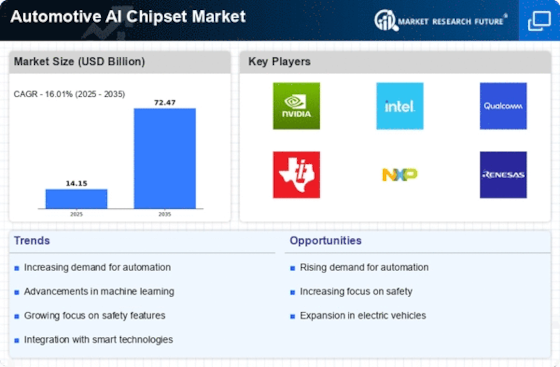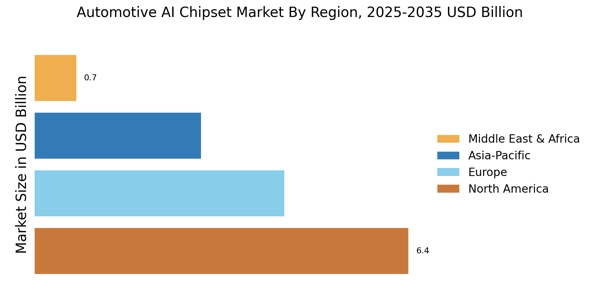Growing Electrification of Vehicles
The Automotive AI Chipset Market is significantly influenced by the growing trend of vehicle electrification. As manufacturers shift towards electric and hybrid vehicles, the need for efficient AI chipsets becomes paramount. These chipsets are essential for managing battery performance, energy consumption, and overall vehicle efficiency. Recent statistics indicate that the electric vehicle market is expanding rapidly, with projections suggesting that electric vehicles could account for a substantial portion of total vehicle sales in the coming years. This shift towards electrification not only drives innovation in the Automotive AI Chipset Market but also aligns with global sustainability goals.
Expansion of Smart Mobility Solutions
The Automotive AI Chipset Market is being driven by the expansion of smart mobility solutions that integrate AI technologies into transportation systems. As urbanization increases, cities are adopting smart transportation initiatives that rely on AI for traffic management, route optimization, and vehicle-to-everything (V2X) communication. This trend not only enhances the efficiency of transportation networks but also improves the overall user experience. The growing emphasis on smart mobility solutions indicates a robust future for the Automotive AI Chipset Market, as these technologies become integral to modern urban infrastructure.
Rising Demand for Enhanced Safety Features
The Automotive AI Chipset Market is experiencing a notable surge in demand for enhanced safety features in vehicles. As consumers become increasingly aware of road safety, manufacturers are integrating advanced AI chipsets to support features such as automatic emergency braking, lane-keeping assistance, and adaptive cruise control. According to recent data, the market for advanced driver-assistance systems (ADAS) is projected to grow significantly, with AI chipsets playing a crucial role in this evolution. The integration of these technologies not only improves vehicle safety but also enhances the overall driving experience, making it a key driver in the Automotive AI Chipset Market.
Advancements in Machine Learning Algorithms
The Automotive AI Chipset Market is being propelled by advancements in machine learning algorithms that enhance vehicle performance and decision-making capabilities. These algorithms enable vehicles to process vast amounts of data in real-time, allowing for improved navigation, predictive maintenance, and personalized user experiences. The increasing complexity of driving environments necessitates sophisticated AI solutions, which in turn drives the demand for high-performance chipsets. As machine learning continues to evolve, it is likely that the Automotive AI Chipset Market will see a corresponding increase in the adoption of these advanced technologies, further solidifying their importance in modern vehicles.
Increased Investment in Research and Development
The Automotive AI Chipset Market is witnessing a surge in investment directed towards research and development. As competition intensifies among automotive manufacturers and technology companies, there is a concerted effort to innovate and enhance AI capabilities within vehicles. This investment is crucial for developing next-generation chipsets that can support advanced functionalities such as real-time data processing and enhanced connectivity. The influx of capital into R&D is likely to yield breakthroughs that will further propel the Automotive AI Chipset Market, ensuring that manufacturers remain at the forefront of technological advancements.
















